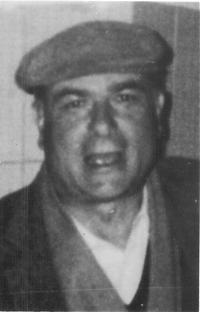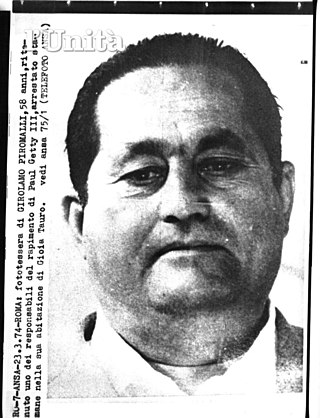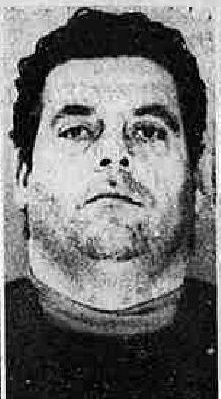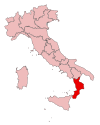Related Research Articles
The 'Ndrangheta is an Italian Mafia-type association based in the peninsular region of Calabria and dating back to the 19th century. Although loosely structured, it is considered one of the most powerful organized crime groups in the world. It is characterized by a horizontal structure made up of autonomous clans known as 'ndrine, based almost exclusively on blood ties. Since the 1950s, following wide-scale emigration from Calabria, 'Ndrangheta clans dispersed to other European countries, Australia and the Americas. Currently, its main activity is drug trafficking, but it also deals with human trafficking, sex trafficking, arms trafficking, money laundering, racketeering, extortion, and loan sharking.
A capocrimine is the elected boss of the crimine, an annual meeting of the 'Ndrangheta locali near the Sanctuary of Our Lady of Polsi in the municipality of San Luca during the September Feast. Far from being the "boss of bosses", the capo crimine actually has comparatively little authority to interfere in family feuds or to control the level of interfamily violence.

Giuseppe Morabito, nicknamed 'u tiradrittu, is an Italian criminal and a historical boss of the 'Ndrangheta, a Mafia-type organisation in the region of Calabria (Italy). He hails from Africo in the Locride. He was a fugitive from 1992 and included in the list of most wanted fugitives in Italy until his arrest in February 2004.

The 'ndrina is the basic unit of the 'Ndrangheta of Calabria, made up of blood relatives, and is the equivalent of the Sicilian Mafia’s "family" or cosca. The word derives from the Greek, meaning "a man who does not bend". Each 'ndrina is "autonomous on its territory and no formal authority stands above the 'ndrina boss." The 'ndrina is usually in control of a small town or a neighbourhood in larger cities, even outside Calabria, in cities and towns in the industrial North of Italy in and around Turin and Milan.

Giuseppe Coluccio is an Italian criminal and a member of the 'Ndrangheta, a Mafia-type organisation in Calabria. He was a fugitive since 2005 and included in the list of most wanted fugitives in Italy until his capture on 7 August 2008, in Toronto, Ontario, Canada.

The Piromalli 'ndrina is one of the most powerful clans of the 'Ndrangheta, a criminal and mafia-type organisation in Calabria, Italy. The 'ndrina is based in Gioia Tauro on the Tyrrhenian coast. The Piromalli's are allied with their relatives of the Molè family, also from Gioia Tauro. Often they are referred to as the Piromalli-Molè clan. The Piromalli clan contains more than 200 members.
The Cataldo 'ndrina is a clan of the 'Ndrangheta, a criminal and mafia-type organisation in Calabria, Italy. This particular 'ndrina is based in Locri, a hotbed of 'Ndrangheta activity. The clan, allied with the Marafioti family, is involved in a long blood feud with the Cordì 'ndrina, from the same town, since the end of the 1960s.
The Barbaro 'ndrina is a powerful clan of the 'Ndrangheta, a criminal and mafia-type organisation in Calabria, Italy. The 'ndrina belongs to the locale of the town of Platì. According to the Direzione Investigativa Antimafia, the Barbaro 'ndrina is one of the most powerful 'Ndrangheta clans. The clan also operates in the northern Italian regions of Lombardy, Piemonte and overseas in Australia, in particular in the Griffith, New South Wales area.
The Bellocco 'ndrina is a clan of the 'Ndrangheta, a criminal and mafia-type organisation in Calabria, Italy. The 'ndrina is based in Rosarno, on the Tyrrhenian coast, and belongs to the locale of that town, particularly very active in drugs trafficking, arms trafficking, extortion and control of commercial and entrepreneurial activities.

Francesco Barbaro, also known as U'Castanu, was a boss of the 'Ndrangheta, a Mafia-type criminal organisation based in Calabria, Italy. Born in Platì, he was the head of the Barbaro 'ndrina. He was the son of Francesco Barbaro and Marianna Carbone, who at the beginning of the twentieth century gave rise to the powerful Barbaro 'ndrina, which was later divided into various branches, namely the Castani, the Nigri, the Pillari and the Rosi, with links to all the most important gangs of the 'Ndrangheta.
Girolamo Molè, also known as Mommo, is an Italian criminal and a member of the 'Ndrangheta in Calabria. He is currently serving several life sentences.
Salvatore Aquino, also known as "Turi", is an Italian criminal and a member of the 'Ndrangheta in Calabria. He is the boss of the Aquino 'ndrina from Marina di Gioiosa Ionica and is closely related to Giuseppe Coluccio, leader of drug trafficking.
Francesco Mazzaferro, also known as Ciccio, is an Italian criminal and a member of the 'Ndrangheta in Calabria. He belongs to the Mazzaferro 'ndrina from Gioiosa Ionica. The clan is opposed to the Aquino-Scali-Ursino clan from the same town. He was leading the Mazzaferro 'ndrina together with his brothers Giuseppe and Vincenzo. Together with his cousin Rocco Lo Presti, Mazzaferro also controlled Bardonecchia and Val di Susa in Piedmont.
The Camera di Controllo, is a collegial body of the 'Ndrangheta, a Mafia-type organisation in Calabria. It is also known as La Provincia or Camera di Compensazione. It is composed of leading 'Ndrangheta members to decide on important questions concerning the organization and settling disputes.
The Pesce 'ndrina is a clan of the 'Ndrangheta, a criminal and mafia-type organisation in Calabria, Italy. The 'ndrina is based in Rosarno on the Tyrrhenian coast.
Vincenzo Pesce, also known as Cenzo, is an Italian criminal and a member of the 'Ndrangheta, a Mafia-type organisation in Calabria. He is based in Rosarno and heads the Pesce 'ndrina.

Rocco Lo Presti, known in Marina di Gioiosa Ionica, his town of origin as "Roccu u Maneja", was an Italian crime boss of the 'Ndrangheta, a Mafia-type organization in Calabria, Italy, but his criminal base was Bardonecchia, in Piedmont region.
The Lo Presti 'ndrina of Bardonecchia is a clan of the 'Ndrangheta, a mafia-type organization in Calabria, Italy.
The Mancuso 'ndrina is a clan of the 'Ndrangheta, a criminal and mafia-type organisation in Calabria, Italy. The 'ndrina is based in Limbadi and Nicotera and is considered by the investigative bodies as the most influential clan in the province of Vibo Valentia.
References
- ↑ Circolo formato. Le motivazioni: la cosca Mazzaferro esiste
- ↑ "Marina di Gioiosa Jonica: 40 arresti cosca Mazzaferro. In manette sindaco Rocco Femia". web.archive.org. April 2, 2012. Retrieved April 7, 2024.
- 1 2 Gratteri, Nicola. Fratelli di sangue. Storie, boss e affari della 'ndrangheta, la mafia più potente del mondo. Mondadori. p. 136. ISBN 8804597127.
- ↑ Ciconte, Enzo (1996). Processo alla 'Ndrangheta (in Italian). p. 139.
- ↑ "I Mazzaferro, tre fratelli che trasformarono il Nord in una roccaforte della 'ndrangheta". La Stampa (in Italian). November 18, 2014. Retrieved April 7, 2024.
- ↑ "MAXIRETATA ALL' ALBA PER LA ' NDRANGHETA DURO COLPO A MILANO - la Repubblica.it". Archivio - la Repubblica.it (in Italian). June 16, 1994. Retrieved April 7, 2024.
- ↑ "Femia: boss tra 'ndrangheta e servizi. Le minacce a Tizian: 'Gli sparo in bocca'". Il Fatto Quotidiano (in Italian). July 25, 2013. Retrieved April 7, 2024.
- ↑ "'Ndrangheta, a Limbadi la multinazionale del narcotraffico: spostava cocaina dalla Colombia e hashish dall'Albania". Il Fatto Quotidiano (in Italian). January 28, 2019. Retrieved April 7, 2024.
- ↑ Ciconte, Enzo (1996). Processo alla 'Ndrangheta . p. 139. ISBN 88-420-4956-5.
{{cite book}}: Unknown parameter|agency=ignored (help)
